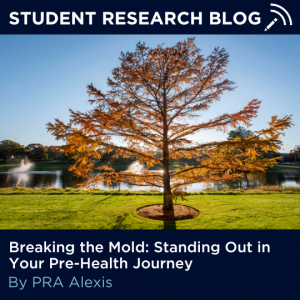By Alexis Elkinson, Peer Research Ambassador
 The road to a career in medicine, dentistry, or any graduate health program is often paved with rigorous coursework, competitive exams, and carefully curated extracurriculars. Many students strive to become the “perfect” or “cookie-cutter” applicant—someone with a flawless GPA, high test scores, and a checklist of clinical or community service hours and research experience. But the truth is, admissions committees are looking for more than just numbers. They seek individuals who are unique, passionate, and self-aware. So, how can you stand out? By embracing what makes you different, sharing your authentic experiences, and demonstrating your commitment to growth—both as a future healthcare professional and as a person.
The road to a career in medicine, dentistry, or any graduate health program is often paved with rigorous coursework, competitive exams, and carefully curated extracurriculars. Many students strive to become the “perfect” or “cookie-cutter” applicant—someone with a flawless GPA, high test scores, and a checklist of clinical or community service hours and research experience. But the truth is, admissions committees are looking for more than just numbers. They seek individuals who are unique, passionate, and self-aware. So, how can you stand out? By embracing what makes you different, sharing your authentic experiences, and demonstrating your commitment to growth—both as a future healthcare professional and as a person.
One of the most powerful ways to differentiate yourself is by recognizing both your strengths and weaknesses. While it’s easy to showcase achievements, true growth comes from acknowledging areas for improvement and actively working on them. I have learned this through my experiences as a karate instructor, where I teach students not just self-defense, but also discipline, confidence, and perseverance. In martial arts, progress is not always linear—failures and setbacks are inevitable. Yet, these challenges build resilience. In the same way, the journey to a healthcare career is full of obstacles, but how we approach them defines our character. By showing admissions committees how you have grown from challenges—whether through academics, leadership, or patient interactions—you demonstrate the qualities that will make you a compassionate and adaptable provider.
My experience in karate, specifically Tang Soo Do, has been one of the most defining aspects of my personal and professional growth. As an instructor, I work with students of all ages, guiding them not just in physical techniques but in developing mental and emotional strength. Every day, I emphasize the importance of self-confidence, humility, and perseverance—lessons that extend far beyond the dojo. Watching my students overcome challenges, set goals, and push through failures has reinforced my own belief in lifelong learning and self-improvement. Much like in medicine, success in martial arts does not come easily; it requires discipline, patience, and the ability to support and uplift those around you. These are the same values I carry into my work in healthcare—helping patients navigate their own struggles, empowering them to take control of their well-being, and ensuring that they feel seen and supported.
Beyond academics and clinical experience, your interests and passions set you apart. Have you started a club, pursued an unusual hobby, traveled, or engaged in creative work? These experiences shape your identity and make your application memorable. For me, teaching karate has reinforced my ability to guide and mentor others, skills that directly translate to patient care. Volunteering has not only allowed me to serve my community but has also taught me the importance of self-care—realizing that in order to give my best to others, I must first invest in my own self growth. These moments have shaped my understanding of leadership, teamwork, and service, all of which are invaluable in the medical field.
Medicine is a team effort, and admissions committees want to see that you can collaborate, lead, and support others. It is easy to focus on personal accomplishments, but true success comes from lifting others up. Whether through shadowing, research, or community involvement, reflect on how you have demonstrated teamwork. Did you mentor new volunteers? Work alongside physicians, nurses, or researchers to solve a problem? These experiences show your ability to navigate complex environments and contribute meaningfully to a healthcare team.
Ultimately, your application should tell the story of who you are—not just a list of accomplishments, but a reflection of your values, motivations, and aspirations. Graduate programs do not just want smart students; they want future healthcare leaders who are driven, empathetic, and committed to lifelong learning. So ask yourself: What fuels your passion? What experiences have shaped you into the person you are today? By embracing your individuality and making the most of every opportunity, you will not just stand out—you will inspire others to do the same.
Alexis is a senior majoring in Physiology & Neurobiology. Click here to learn more about Alexis.